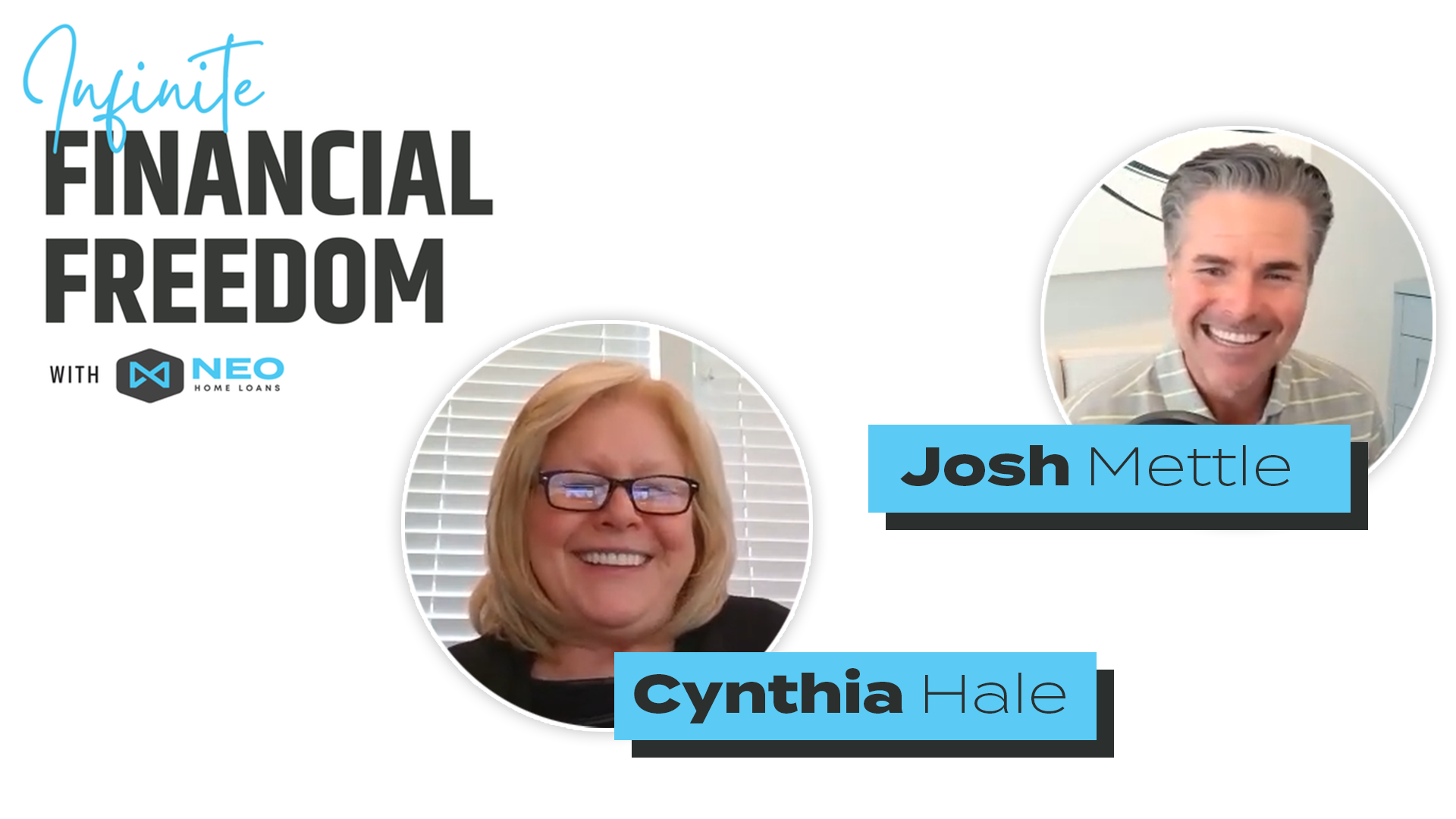When someone buys a property, they often only consider the initial cost. What if you were able to fast forward 20-years? That initially shocking purchase price will likely look much more manageable.
Here is the reason why: the cost of debt will remain constant while your income will likely go up and the loan balance will go down as you continue to make payments.
Inflation will increase prices throughout the economy, making dollars less valuable. Over time, this helps homeowners destroy debt with the properties they own. They will be paying off the mortgage with future less valuable dollars. This is known as inflation-induced debt destruction.
To show you a real-world example of this in action, we recently spoke with Cynthia Hale, lifetime business partner, mentor, and MOM of NEO Home Loans’ Josh Mettle! They discuss the ups and downs of their 20-year journey of owning property together on our most recent episode of Infinite Financial Freedom.
20-YEAR JOURNEY OF RUNNING A PROPERTY
The following is an excerpt of Infinite Financial Freedom episode, “Lessons Learned Over 20 Years of Owning an Apartment Building w/ Cynthia Hale (a.k.a. Mom).” Listen to the full podcast here. (Also on Apple Podcasts and Spotify.)
After discussing how they obtained their property and got it under control, Josh and Cynthia explain how they began making a positive cash flow from it over time.
PODCAST TRANSCRIPT
JOSH METTLE (19:13):
We learned on the fly. Our first three properties, we made more mistakes than you could possibly imagine. And they still all worked out for us over time.
So, the first lesson that I learned in real estate is that time cures all. All of these mistakes where we overpaid on a property, and then there was foreclosures in the area that drove down the values. All of the mistakes with what we decided to renovate, I’m sure there’s a lot of things we could have done more economical. All of those mistakes are cured over time, because over time rents go up, appreciation goes up, and your debt goes down. There’s, what’s called inflation-induced debt destruction at work. Uh, what’s that? Well, what happens is over time you make more money.
And the relative cost of the debt goes down with inflation. Earnings go up, but the cost of your credit, the mortgage stays the same. Or in the case that mom talked about, we refinanced many times to lower interest rates. So the amount of income that we’re creating in our rental businesses and across all of our properties, 20 years later, the amount of mortgage we had on that property was now so low. We were able to just, pay it down and pay it off.
But at the time (20 years ago) that mortgage of 315,000 was huge. I mean, it was massive. And so over years you have the benefit of inflation induced debt destruction. I did another podcast on that with Jason Hartman. So if anybody wants to check that out, I’d encourage you to check out the Jason Hartman interview. (“Playing the Game of Debt with Jason Hartman.” Discussion begins around 21:10.)
The other thing that I want to pull out of this is, this concept around OPM, “Other People’s Money.” And when it got down to it, we had somebody renegotiate the financing terms on us, and we didn’t say screw it. We leveraged OPM, other people’s money and we brought them in as a partner. We recorded a first mortgage on the property and we paid them an eight and a half percent return, which remember, that that was the going rate 20 years ago. So that wasn’t like an obscene rate at that time. And we made it go right. We used all of our own capital for improvements. We slowly increased the rents. We got blessed by falling interest rates over time, and we earned our way into cash flow over the first five years.
CYNTHIA HALE:
The pitch to my mom (who we asked to lend us the money) was, look, you need to invest your money. They just sold a complex, Josh and I will manage it for free. We’ll do the management and the upgrades for free. And if we completely screw up, it’s a great piece of property for the estate. And so that was my pitch and they bought it.
JOSH METTLE:
Well and not for free, right? I mean, we’re doing all the work and we’re paying them eight and a half percent. And if it doesn’t work out,
CYNTHIA HALE:
Even if they had to foreclose on us or make us give it up, they had been getting an interest all that time. They got free management and they’d take over a property that was in pretty good shape because we’ve been running it. So, I mean, if we totally screwed up, they’d be in a good position.
JOSH METTLE:
Yeah. Well, that’s a great point. I think there’s more to it than that. If you’re going to leverage OPM, “Other People’s Money,” you better be passionate about it. You better have a good pitch. You better have thought it through, you know, what’s in it for the other person that you’re asking to leverage their money. How are they secured? What’s their upside? What’s their worst-case scenario? And how would you get yourself through it?
CYNTHIA HALE:
Yep.
CONCLUSION
The property used in this example was worth $315,000 when Josh Mettle and Cynthia Hale first purchased it. It is now worth somewhere between $2-2.5 Million!
Rents averaged $300 per month when they first started and today their most recent rents are around $1,490. Their gross annual rents went from $28,000 to $123,840 over those 20 years. While rents went up, the cost of the mortgage debt went down because of lower interest rates, but also because we were paying yesterday’s loan, with today’s dollars (higher rental income). That’s the power of inflation-induced debt destruction!
For more information on how inflation-induced debt destruction works watch this full episode or see our previous episode “Playing the Game of Debt” with guest Jason Hartman. Discussion begins around 21:10.
ITHomeLoans believes in guiding you throughout your entire homeownership journey. If we’re doing our job right, closing the loan is just the start of our relationship. Wherever you are in your homeownership journey, we look forward to advising you! Send us an email at TheInsightTeam@NEOHomeLoans.com to get started your process. We look forward to hearing from you soon!


